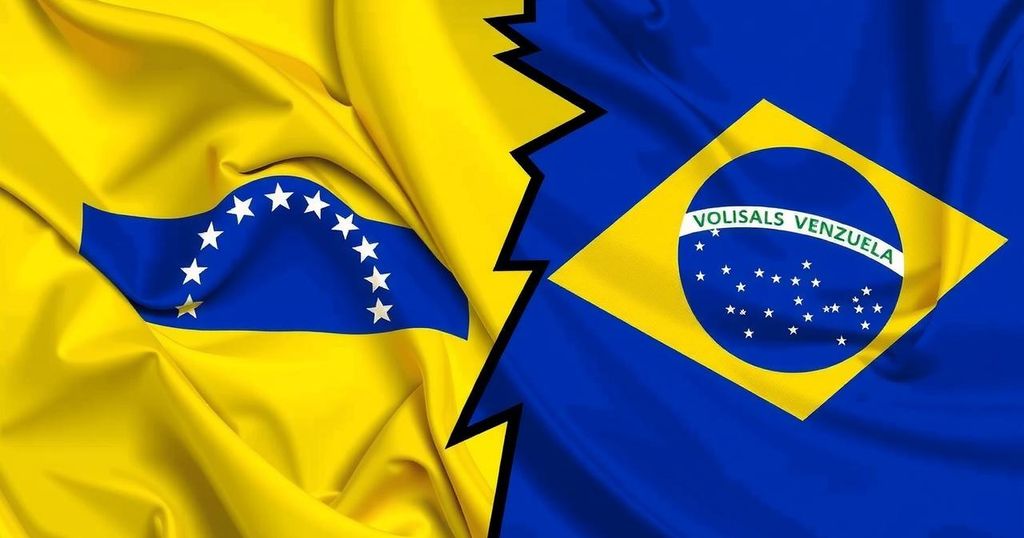Venezuela’s Diplomatic Strain with Brazil Intensifies Over BRICS Membership Veto

Relations between Venezuela and Brazil are rapidly declining after President Nicolás Maduro’s bid to join BRICS was thwarted by Brazil. Maduro’s allies accused Brazil of acting in service of U.S. interests, leading to diplomatic actions, including the recalling of ambassadors. Maduro claimed electoral victory despite allegations of fraud, further complicating the bilateral ties.
Tensions between Venezuela and Brazil have escalated following Venezuelan President Nicolás Maduro’s unsuccessful bid to join the BRICS alliance of emerging market nations, hindered by Brazil’s opposition. One of Maduro’s closest allies launched a scathing attack on Celso Amorim, a senior adviser to Brazilian President Luiz Inácio Lula da Silva, accusing him of representing U.S. interests rather than acting on behalf of Brazil. Subsequently, Venezuela’s Foreign Ministry announced the recall of its ambassador from Brazil and summoned Brazil’s chargé d’affaires in Caracas for an official reprimand, as Brazil’s ambassador was unavailable due to a vacation. Although President Lula has remained silent on the matter, having missed a recent summit in Kazan, Russia due to a head injury, Amorim clarified in a congressional hearing that concerns regarding Venezuela’s international reputation following its contentious July presidential election led to its exclusion from BRICS expansion. Maduro, claiming victory in the disputed election without providing evidence of the vote, had sought to align Venezuela with respected regional partners such as Cuba and Bolivia through BRICS. Following the rejection from BRICS, Maduro’s administration accused Brazil of orchestrating a veto, even as they expressed disappointment that Venezuela had not gained admission amidst support from other member states. As the conflict intensified, Maduro and his officials directed criticism towards Brazilian Foreign Minister Mauro Vieira and foreign secretary Eduardo Paes Saboia, with Maduro describing the exclusion as a “stab in the back” but refraining from direct condemnation of Lula. On his television program, he asserted, “No one shuts Venezuela up or vetoes it… I will wait for Lula to observe, be well informed and say what he has to say.” In response, Amorim characterized Venezuela’s reaction as “totally disproportionate.” Attempts at mediation by President Lula and Colombian President Gustavo Petro post-election were unsuccessful, with Lula adopting a firmer stance against Maduro’s repression of dissent, in contrast to Petro’s approach. Despite Maduro’s announcement of victory, allegations of electoral fraud persist, with opposition claims asserting that their candidate, Edmundo Gonzalez, received the majority of votes. Gonzalez has since fled to Spain, while opposition leader María Corina Machado remains in hiding due to ongoing threats of arrest.
The deteriorating relations between Venezuela and Brazil stem from a complex political climate, marked by the recent presidential elections in Venezuela, which were marred by disputes over the legitimacy of the electoral process. President Nicolás Maduro’s administration has faced significant criticism for alleged authoritarian practices and electoral misconduct. On the other hand, Brazil, under the leadership of President Luiz Inácio Lula da Silva, has taken an increasingly critical stance towards Maduro’s government, influenced by concerns about human rights and regional governance. The clash over Venezuela’s aspiration to join the BRICS group highlights the broader geopolitical tensions in Latin America and the differing approaches to governance and diplomacy among regional leaders.
In summary, the diplomatic fallout between Venezuela and Brazil over BRICS membership reflects deep-rooted political discord following disputed elections and differing ideological stances. Maduro’s condemnation of Brazil’s actions underscores the tension, while Brazil’s insistence on international standing criteria for BRICS membership shows its commitment to regional integrity. As the situation progresses, it remains essential to monitor the evolving dynamics between these two neighboring countries, particularly in light of the ongoing challenges within Venezuelan politics.
Original Source: www.livemint.com







